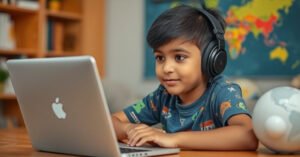The digital age has transformed education, making online learning more accessible and efficient. Students enrolled in international online schools, hybrid schools, and online homeschooling programs in India and worldwide now have the flexibility to learn from anywhere. However, excessive screen time can pose challenges to students’ well-being. Striking the right balance between digital learning and overall health is essential for academic success and personal growth. Here are some effective tips to help students manage screen time while maintaining their well-being.
A well-planned schedule helps students balance their academic responsibilities with personal time. Establish a daily routine that includes:
- Fixed study hours
- Breaks between online sessions
- Outdoor or physical activities
- Family interaction time
- Adequate sleep
This structured approach ensures that students attending an online learning school do not feel overwhelmed by excessive screen time.
Staring at a screen for prolonged periods can cause eye strain. The 20-20-20 rule is a simple yet effective technique to reduce discomfort:
- Every 20 minutes, take a 20-second break and look at something 20 feet away.
- Blink frequently to keep the eyes moist.
- Adjust screen brightness and contrast to reduce glare.
This rule is beneficial for students engaged in online homeschooling in India and globally.
Even in a digital-first learning environment, students can engage in offline educational activities, such as:
- Reading physical books
- Writing assignments in notebooks
- Conducting hands-on experiments
- Engaging in creative arts and crafts
International online schools often provide printable worksheets and projects that help students reduce screen dependency.
Prolonged exposure to blue light from screens can interfere with sleep patterns and cause eye strain. To mitigate this:
- Use blue light filter apps or enable night mode on devices.
- Adjust the font size and background color for comfortable reading.
- Position the screen at eye level to prevent neck strain.
Physical movement is essential for maintaining overall well-being. Students should be encouraged to:
- Take short walks between classes
- Participate in sports or outdoor activities
- Practice yoga or stretching exercises
Hybrid school students who split time between online and offline learning environments can incorporate physical activities into their daily routines.
Creating screen-free zones can help students disconnect from digital devices. Designate areas where screens are not allowed, such as:
- The dining table
- The bedroom before bedtime
- Family activity areas
This helps students enrolled in online homeschooling in India and elsewhere develop healthier screen habits.
Tracking screen time allows students to manage their digital exposure effectively. Various apps can help monitor screen usage and encourage breaks. Additionally:
- Set daily screen time limits.
- Use focus apps that block distractions during study sessions.
- Prioritize digital tools that support learning rather than entertainment.
Parents and educators at international online schools can guide students in making better digital choices.
While online schooling provides academic flexibility, social interaction is equally crucial for mental well-being. Encourage students to:
- Participate in virtual study groups or extracurricular activities
- Spend time with family and friends
- Engage in hobbies like painting, playing musical instruments, or gardening
A hybrid school model allows students to experience both online and offline social interactions.
Maintaining good posture while using digital devices can prevent long-term health issues. Students should:
- Sit on a comfortable chair with proper back support
- Keep their feet flat on the ground
- Use a desk that positions the screen at eye level
Online homeschooling students should create a dedicated, ergonomic study space at home to enhance focus and comfort.
Adequate sleep is vital for cognitive function and overall well-being. To improve sleep quality:
- Avoid screens at least an hour before bedtime
- Maintain a consistent sleep schedule
- Practice relaxation techniques, such as meditation or deep breathing
Students attending online learning schools must prioritize mental well-being by managing stress and seeking support when needed.
Online education, whether through an international online school, hybrid school, or online homeschooling in India, offers unparalleled flexibility. However, students must adopt healthy digital habits to maintain their well-being. By setting structured routines, incorporating offline activities, and prioritizing physical and mental health, students can enjoy the benefits of online learning while minimizing its challenges.
Balancing screen time is not about eliminating digital learning but about making mindful choices that support overall growth and success.





